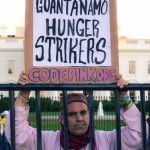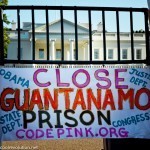Medea Benjamin's Blog, page 19
May 7, 2013
Why I Am on a Hunger Strike to Shut Down Guantanamo Bay Prison
By Diane Wilson
As a fourth generation shrimper and an environmental activist on the Texas gulf coast, I have gone on hunger fasts to protect the seas that my community of fishermen depend upon. I know how far I would go to be heard. To have a voice. To push for justice. So I can vouch for the experts who say that the 100+ hunger strikes happening now in Guantanamo prison reflect the level of desperation and despair felt by the prisoners there. The detainees are screaming for justice from the outside world. And now they are being heard.
Here is one despairing voice:
Adnan Latif spent 10 years in Guantanamo without being charged. He was a poet, father and a husband and had been cleared for release four times. Yet he continued to be imprisoned. He was found dead in his cell, one of 9 men who have died at Guantanamo. In his own words, Latif asked, “Where is the world to save us from torture? Where is the world to save us from the fire and sadness? Where is the world to save the hunger strikers?”
My question is a lot more personal: Where are we, citizens of America?
This is a US detention and interrogation center. A prison, by all counts. Many have called it a gulag, a shame, a scandal, and they wouldn’t be wrong. The vast majority of the 166 men still trapped at Guantánamo have been held for more than 11 years without charge or fair trial. Eighty-six Guantanamo prisoners were cleared for release more than three years ago. The Navy, Army, and Marines have no reason to press charges.
Currently, more than 100 detainees are on a hunger strike, with 21 being force-fed and 5 hospitalized. The forced tube feeding, according to prisoners who have experienced it, is itself an act of torture and very debilitating. A medical back-up team of at least 40 has arrived at Guantanamo Bay as the number of inmates taking part in the hunger strike continues to rise, fueling speculation that the condition of the hunger-striking prisoners is deteriorating.
If the chains of good ol’ American indifference continue, hard and unabated, as they have currently been, then the men of Guantanamo Bay might remain there until hell freezes over.
Where are you, Mr. President?
When President Obama took office in 2009, he vowed to shut down the Guantanamo Bay prison within a year. It’s 2013 and the prison still stands, prisoners remain– but in solitary confinement, ostensibly to reduce camaraderie and hopefully those hunger strikes! Some consider Guantanamo President Obama’s Shame. However, according to President Obama’s speech on Tuesday, he wasn’t a bit surprised they were having problems. Obama called Guantanamo unsafe and expensive to the US taxpayers and said it lessens cooperation with US allies. He said he would really like to shut it down and he is going to work on it!
Okay, President Obama, the time to talk and ruminate is over with. Now is the time for action. And what can you do? Well, pardon a back woods shrimper from the gulf coast for saying this: Congress may have imposed unprecedented restriction on detainee transfers, but you, Mr. President, still have the power to transfer men right now. You can and should use the certification/waiver process created by Congress to transfer detainees.
According to the ACLU, there are two essential steps the president can take. One is to appoint a senior point person so that the administration’s Guantanamo closure policy is directed by the White House and not by Pentagon bureaucrats. The president can also order the secretary of defense to start certifying for transfer detainees who have been cleared, which is more than half the Guantanamo population.
You, President Obama, must demonstrate immediate, tangible progress toward the closure of Guantanamo, or the men who are on hunger strikes will die, and you will be ultimately responsible for their deaths.
Where are you, Congress?
Well, Congress, you must not sleep well at night. And contrary to what you believe or what you might believe the American people believe, you can not incarcerate forever a group of people who have not been tried. Sticking them in Cuba will not hide the fact, either. Just as the infamous prison in Northern Ireland where men such as Bobby Sands conducted hunger strikes, died, and stained forever Britain’s human rights record, so Guantánamo stains America.
And where am I? Well, I know where this one American is. I stand in solidarity with the Guantanamo prisoners on their hunger strike and I have been, and will continue to, fast indefinitely until justice comes. Shut Guantanamo down!
Diane Wilson is a fourth-generation shrimper, environmental activists, and peace advocate from the Texas Gulf Coast.







May 6, 2013
Freedom Before Breakfast -Guantanamo Hunger Strike
Close Guantanamo
I am fasting today in support of the hunger strike of 100 prisoners at Guantanamo. As the day passes, I am struck by the stark contrast of my own life to that of the prisoners who have been refusing food for several weeks.
I cannot imagine the conditions under which they have embarked on this hunger strike. Many of these people have been held at Guantanamo for a decade. They have been abused in every way possible, tortured, denied legal aide, or even trials. 86 of the prisoners have been cleared of all charges, but not released.
Meanwhile, I go hungry for one day. I keep warm by sitting in the sun. The prisoners do not have this choice. I catch myself fantasizing about breakfast tomorrow. The prisoners intend to have no breakfast before freedom … even if it means death. I take a slow, meditative walk down the road. The prisoners do not get this option. I distract myself with facebook, twitter, blogging . . . such a luxury. The prisoners cannot even call the President or the Department of Defense to complain, as I have done on their behalf all day.
Tomorrow this fast will end for me, but it won’t for the prisoners.
CodePink has organized a ‘rolling fast’, gathering nearly 1,000 pledges from citizens to do 24hr fasts. Each person can pick their day, or days, to engage in this protest. Everyone is asked to call, email, fax, etc, the White House, the Department of Defense, and several other people to ask for the closure of Guantanamo.
CODEPINK rolling fast to close Guantanamo
Deepak Chopra, Eve Ensler, and Julian Assange have all joined the pledge.
You can too. Please, read more about CodePink’s urgent call to action. Guantanamo has long filled the hearts of many Americans with shame, unease, and anger. President Obama campaigned on a promise to close Guantanamo. Numerous protests and actions have been held. But even as the hunger strike of the prisoners draws international attention, many are being force fed, several have been hospitalized, and the already much-abused lives of these prisoners are once more on the line.
It is our time to join in to help.
Read more here: http://www.codepink.org/article.php?id=6397
Pledge to fast here:http://codepink.salsalabs.com/o/424/p/dia/action3/common/public/?action_KEY=7140
Tell your friends through all mechanisms. I am grateful for my six friends who pledged to fast today with me. Our conversations, reflections, and yes, humor, too, have made this political action a thought-provoking experience. Thank you to CodePink for organizing and to all of you who will be inspired to help close Guantanamo and offer real justice to the prisoners.







April 27, 2013
San Francisco Pride Gets Cold Feet over Gay WikiLeaker Bradley Manning
San Francisco Pride Gets Cold Feet over Gay WikiLeaker Bradley Manning
by Nancy Mancias
What’s up with the San Francisco LGBT Pride Celebration Committee? On April 24, 2013, the committee announced its line up of grand marshal’s which included Army Private First Class Bradley Manning.
Then, it says, Oops! Sorry Brad, You’re off the list!
On April 24, 2013, Seth Hemmelgarn with Bay Area Reporter writes, “Pride’s electoral college, which is made up of former grand marshals, has selected Army Private First Class Bradley Manning as its choice for grand marshal. Manning has admitted to leaking 700,000 classified U.S. government documents to WikiLeaks and is facing court-martial. He is currently in custody and will not be attending the parade, although he will have supporters appearing on his behalf.”
News of Bradley Manning’s selection sent supporters cheering and the opposition spinning! Courage to Resist, a group of concerned community members, veterans, and military families, based in Oakland, alerted its members about the selection and encouraged them to stand with Bradley Manning in the parade. The group coordinated similar contingents in past pride parades.
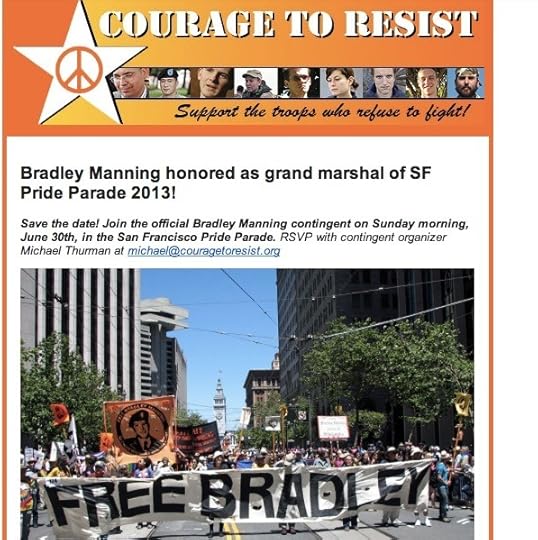
Sean Sala, an organizer for the 2011 Active Duty Military March in San Diego Pride, had a different take on Manning’s selection. He released a statement against it. Published in Instinctmagazine.com:
[image error]
On April 26, 2013, San Francisco Pride Board President, Lisa L. Williams released a statement retracting Bradley Manning as grand marshal. Williams states, “His nomination was a mistake and should never have been allowed to happen.” Now if Williams was proactive in reaching out to Courage to Resist instead of acting hastily, she would of learned that Manning’s nomination was not a mistake. She would of learned about his solitary confinement and his months spent in jail with a trial.
William goes on to write, “Bradley Manning is facing the military justice system of this country. We all await the decision of that system. However, until that time, even the hint of support for actions which placed in harms way the lives of our men and women in uniform — and countless others, military and civilian alike — will not be tolerated by the leadership of San Francisco Pride.”
While Williams and San Francisco Pride wait on the courts decision, they ignore a important fact that the U.S. government put soldiers, civilians and journalists in harms ways. On April 4, 2010, WikiLeaks published a classified video of a U.S. Apache helicopter firing on innocent civilians in the Iraqi suburb of New Baghdad in 2007, two of those killed were Reuter’s employees.
As soon as Williams launched the SF Pride statement about Bradley Manning, a debate took off on social media. Twitter and Facebook lit up! The San Francisco chapter of Iraq Veterans Against the War even submitted a post on its Facebook wall against San Francisco Pride’s decision to remove Manning as grand marshal.
[image error]
Lisa L. Williams and San Francisco Pride’s decision to retract Bradley Manning as grand marshal is a mistake, it isolates and hurts a part of the community working for social justice. We are a community inclusive of everyone even if we don’t agree with them, but, perhaps, Manning’s decision to expose U.S. war crimes gives Lisa and San Francisco Pride cold feet.







April 25, 2013
Julian Assange on George Bush’s Library and Bradley Manning’s Trial
Medea Benjamin
I had an opportunity to interview WikiLeaks founder Julian Assange at the Ecuadorian Embassy in London, where he has been granted political asylum since June 2012. Assange is wanted for questioning in Sweden over sex allegations, although he has never been charged. Assange believes that if sent to Sweden, he would be put into prison and then sent to the United States, where he is already being investigated for espionage for publishing hundreds of thousands of classified diplomatic and military memos on the WikiLeaks website.
George W. Bush’s new presidential library at Southern Methodist University in Texas has opened with great fanfare, including the attendance of Presidents Obama and former Presidents Carter, Bush Sr. and Clinton. George Bush has said that the library is “a place to lay out facts.” What facts would you like to see displayed at his library?
A good place to start would be laying out the number of deaths caused by the invasions of Iraq and Afghanistan. At Wikileaks, we documented that from 2004-2009, the US had records of over 100,000 individual deaths of Iraqis due to violence unleashed by that invasion, roughly 80% of them civilians. These are the recorded deaths, but many more died. And in Afghanistan, the US recorded about 20,000 deaths from 2004-2010. These would be good facts to include in the presidential library.
And perhaps the library could document how people around the world protested against the invasion of Iraq, including the historic February 15, 2003 mobilization of millions of people around the globe.
Many people worked hard during the Bush years to protest the wars, but the Bush administration refused to listen. It was very demoralizing for people to think that their efforts were for naught.
They should not be demoralized. I believe that the opposition to the Iraq war was very important, and that it actually altered the behavior of US forces during the initial invasion of Iraq. Compare it to the 1991 Gulf War, when massive numbers of Iraqis, both soldiers and civilians, were killed. In the 2003 invasion there was a lot more concern about casualties. The protests rattled their cage.
We released a memo that showed that if the prospective military operation might kill over 30 people, it had to be approved all the way up the chain of command. So while the protests did not stop the war, they did have an impact on the way the war was initially conducted, and that’s important.
While George Bush is feted in Dallas, Bradley Manning languishes in jail. His trial will begin on June 2. Bradley already pleaded guilty in February to ten charges, including possessing classified information and transferring it to an unauthorized person. Those pleas alone could subject him to 20 years in prison. On top of that, the government has added espionage charges that could put him in prison for life.
What do you think the trial will be like?
It will be a show trial where the government tries to prove that by leaking the documents, Bradley “aided and abetted the enemy” or “communicated with the enemy.” The government will bring in a member of the Navy Seal team that killed bin Laden to say that he found some of the leaked information in bin Laden’s house.
But it’s ridiculous to use that as evidence that Bradley Manning “aided the enemy”. Bin Laden could have gotten the material from The New York Times! Bin Laden also had a Bob Woodword book, and no doubt had copies of articles from The New York Times.
The government doesn’t even claim that Bradley passed information directly to “the enemy” or that he had any intent to do so. But they are nonetheless making the absurd claim that merely informing the public about classified government activities makes someone a traitor because it “indirectly informs the enemy”.
With that reasoning, since bin Laden recommended that Americans read Bob Woodward book Obama’s War, should Woodward be charged with communicating with the enemy? Should The New York Times be accused of aiding the enemy if bin Laden possessed a copy of the newspaper that included the WikiLeaks material?
What are some things that Bradley Manning supporters can do to help?
They should pressure the media to speak out against the espionage charges. The Los Angeles Times put out a good editorial but other newspapers have been poor. A Wall Street Journal column by Gordon Crovitz said that Bradley should be tried for espionage, and that I should be charged with that as well because I’m a “self-proclaimed enemy of the state.”
If Manning is charged with espionage, this criminalizes national security reporting. Any leak of classified information to any media organization could be interpreted as an act of treason. People need to convince the media that it is clearly in their self-interest to take a principled stand.
What are other ways people can help Bradley Manning’s case?
People could put pressure on Amnesty International and Human Rights Watch. These groups briefly protested the horrible conditions under which Bradley was detained when he was held in Quantico, but not the fact that he’s being charged with crimes that could put him in prison for life.
It’s embarrassing that Amnesty International and Human Rights Watch—Amnesty International headquartered in London and Human Rights Watch headquartered in New York—have refused to refer to Bradley Manning as a political prisoner or a prisoner of conscience.
To name someone a political prisoner means that the case is political in nature. It can be that the prisoner committed a political act or was politically motivated or there was a politization of the legal investigation or the trial.
Any one of these is sufficient, according to Amnesty’s own definition, to name someone a political prisoner. But Bradley Manning’s case fulfills all of these criteria. Despite this, Amnesty International has said that it’s not going to make a decision until after the sentence. But what good is that?
What is Amnesty’s rationale for waiting?
Their excuse is that they don’t know what might come out in the trial and they want to be sure that Bradley released the information in a “responsible manner.”
I find their position grotesque. Bradley Manning is the most famous political prisoner the United States has. He has been detained without trial for over 1,000 days. Not even the US government denies his alleged acts were political.
Human Rights Watch doesn’t refer to Bradley Manning as a political prisoner either. These groups should be pushed by the public to change their stand. And they should be boycotted if they continue to shirk acting in their own backyard.
Another way for people to support Bradley Manning is to attend his trial in Ft. Meade, Maryland, which begins on June 2, and the rally on June 1. They can learn more by contacting the Bradley Manning Support Network.
Thank you for your time, Julian.
Medea Benjamin is cofounder of www.codepink.org and www.globalexchange.org, and author of Drone Warfare: Killing by Remote Control. She interviewed Assange on April 18, 2013. For more information about Assange’s case, see http://justice4assange.com/extraditing-assange.html.







April 24, 2013
DRONE WARS: How White Privilege Obscures Real Dialogue
By Noor Mir and Rooj Alwazir
Noor is the Pakistani-American anti-drone campaign coordinator at CODEPINK.
Rooj is a Yemeni-American activist and organizer with SupportYemen.
We are not here to proffer an analysis. We aren’t academics. We are here as a Pakistani and a Yemeni, as activists, as citizens of this country and as citizens of our homelands. We are dismayed. We are confused. But we are not hopeless.
We had been waiting for this hearing for a long time. With a handful of location and time changes, rumors floating around of Rand Paul as a witness and a push by human rights organizations around the globe to make calls to their senators and ask them to pose the important questions about civilian casualties of the secret war, the momentum had crescendoed by the time the moment finally approached on Tuesday. We were the first in line at noon for the 4 pm hearing, amused by the cameras trained on members of the Intelligence Committee as they were hurried by their staff into their closed meeting on the Boston bombings. One of our colleagues stood in the receiving line and asked senators the same question as they speed-walked past him, undoubtedly avoiding the activist in pink, “What about Abdulrahman Al-awlaki? He was just a boy? Will you ask about why they killed him with a drone strike?” James Risch eloquently responded with a simple “No.”
Hart 216, ironically the same room where Brennan’s first public confirmation hearing was held and that we disrupted, was filled with journalists and activists, many in Amnesty’s black shirts with white targets. Testimonies started with Retired Marine Corp General James Cartwright and moved down the line, each one with a more or less “pro-drone reform” spin. Rosa Brooks, a law professor at Georgetown spoke of the antiquity of the AUMF with regards to targets with more and more tenuous links to al-Qaeda such as Somalia’s al-Shabaab. We nodded. Ilya Somin, a law professor at George Mason, smiled broadly as he explained that enemy combatants on U.S. soil could be lawful drone targets. Retired Col. Martha McSally was introduced as a special guest of Lindsey Graham’s, which became more and more evident as the hearing proceeded and she spoke about how we were better off calling drones “remotely piloted aircrafts or RPAs” (not dissimilar from CEO of pro-drone lobby AUVSI Michael Toscano’s remark at the Judiciary hearing last month that drones have a negative connotation and we are better off calling them unmanned aerial vehicles). We winced. Peter Bergen spoke about calculating the dead and noted that civilian casualties were significantly reduced in 2013. Then Farea al-Muslimi, a friend from Yemen, took the microphone.
We sobbed.
For the first time ever, there was a public hearing on the human, yes, “human” cost of drone warfare. For the very first time, the drone debate included on its panel of white male faces a young, brown Yemeni man who spoke clearly but emotionally about how hard it was to reconcile his love for America and Americans with the devastation upon his dear Yemen., and his struggle with informing his community about the goodness of America– that these drone strikes which are killing innocent people were not representative of the American people. For the first time, Senators were hearing from someone whose job was not to sift through news sources to calibrate numbers of dead people, or somebody who wrote lengthy legal opinions “reasoning” with murder, or an obvious ex-military apologist for war, cowering behind podiums and office desks. For the first time, Senators saw that the human cost was far beyond dollars and triple digits. It was a man’s identity and morals in question, his home and his family’s life in jeopardy, his difficulty in both loving a country that has given him so much, but taken away equal amounts.
We can relate to his dilemma.
Farea wasn’t there to try to win the hearts and minds of Senate by giving them policy or reform suggestions. He was there to tell his story. But white privilege and its associated subjectivities were clearly in action.
“I have been to Yemen,” Lindsey Graham said to Farea al-Muslimi. Our blood pressures rose. “Isn’t your country in turmoil?” Graham continued. “We have some problems.” replied Al-Muslimi. Graham ended his questioning, self-indulgent smirk on his face, as if to say, “I rest my case.” Although we doubt he is even aware of the terminology, Graham’s neo-colonial presumptions about Farea’s understanding of his own country were disgusting.
No, Senator, you do not rest your case. We, as citizens of the United States and witnesses to the turmoil in this nation, do not accept your reasoning. Schools are shutting down across the country and students are staging walkouts on this very day to protest this blow to their rights to a fair and equal education. Affirmative action is still a subject of debate, as though structural inequalities are a myth. We are still waging an endless, futile and racist war on drugs and extending a school to prison pipeline that is tearing apart families and disenfranchising youth. Racial profiling is rife, with a Palestinian woman in a hijab being assaulted in a Boston suburb last week following the bombings and a Bangladeshi man being savagely beaten in the Bronx on account of the color of his skin. This country is ripped down the middle when it comes to gun control despite the serious shootings that have devastated Aurora (and remember Columbine?). Monsanto damages our food diversity and destroys our health but props up our elected officials with one hand and stifles small farms with the other. There are uprisings, there is dissent, there is police brutality. This country is in no lesser turmoil than Yemen, or Pakistan, just because the standards to which you hold our homelands in comparison to yours is whitewashed by your condescension and insensitivity to difference. Your bigotry precedes you, Senators — your causation is fundamentally flawed.
Lindsey Graham was not the only one whose self-righteous “understanding” of the political and cultural landscapes of places like Pakistan and Yemen barred him from actually exploring the human cost of war. The majority of the hearing focused on analyzing the flaws of the current administration’s reliance on an overbearing executive authority and reforming the AUMF. We waited with bated breath for it to go beyond what we had hoped was only a self-obsessed, stagnant battle of the egos, but it did not. Questions prized legal, constitutional and operational aspects over ones actually pertaining to stories that Farea could have told, their commentaries punctuated with “We thank you for coming such a long way,” or “We thank you for that chilling perspective.” Nobody apologized for bombing his village, Wessab. They ascribed so profoundly and unwaveringly to forceful measures of “counterterrorism” as a given strategy with no room for questioning that they, in turn, tried to reject the validity of his personal experiences.
There are both benefits, and costs to having witnessed a panel of white male privilege embodied, questioning a similarly colored panel, except with one brown face. The outlier, the subject of fascination, the other, upon whom were projected a series of embarrassingly condescending generalizations about the “untrustworthiness” of the Yemeni government and questions about whether “Yemenis supported AQAP before the drone strikes,” to which he answered no (because surprisingly, people of color do not welcome terrorism of any variety). Farea spoke beautifully and passionately when he was afforded the chance about the dangers of drones in creating more enemies than friends, but was not allowed to analyze or explain his statement any further, curtailed by a reliance on legal jargon and reining in executive authority. We are thankful for him being there, but we are distressed that the Subcommittee’s treatment of his presence was just that– a cold, removed, and uninvolved treatment markedly different from their involved and lengthy conversations with the remaining witnesses. Why invite a Yemeni to speak about the human costs of drone wars and then cast a shadow of doubt and ignorance over his experiences by adopting a presumptuous tone?
The benefits are that Farea’s testimony was the only segment of the hearing that was any different from what we have heard before and what the public wants to hear more of. We appreciate that he prompted moral discussion and colored the panel of academics and military experts with his very human experiences of drone-related tragedies. We are grateful that he occupies a very special place as a person who looks at the United States as a second home and as a place of generosity and kindness; this sentiment occupied the center of his testimony and thus positively problematized the complexities of his relationship with drone wars in Yemen.
We must focus on these personal stories, destroyed and mangled bodies, identified by mothers as their son’s via a video on a cell phone. We must focus on his love and respect for this country and his simultaneous dismay at its terror. We must cherish his challenge of the usual power dynamics. We must invite a Farea to every hearing on drone strikes and allow for the voice of a person of color to be empowered and to resound with its own volition, devoid of the presumptions and blanket abstractions of our elected officials. We must disempower them of their given privilege and attend to the power of his words as they are importantly different from the rest. We must not presume that his country is lesser than ours, or more conflicted than ours, or in need of the sort of dialogue that is prefaced on “What I feel is good for you, must be good for you.”
As we left the hearing room, a young male journalist came up to us and said, “Are you with CODEPINK? Do you know that what you do is counterproductive? Your chortling and whispering during the hearing impairs my ability to listen.” This is for him: We are Yemeni, we are Pakistani, we are Americans. We are activists and we are dissenting– be it with an article, or a louder than usual whisper, a die-in in front of a drone manufacturer’s, a sit-in, a voluntary arrest, or charging towards an elected representative.
We stand with justice. We are here to stay.







April 23, 2013
Bush’s legacy ought to be on trial–Instead, it’s put on display
By Jodie Evans and Charles Davis
George W. Bush presided over an international network of torture chambers and, with the help of a compliant Congress and press, launched a war of aggression that killed hundreds of thousands of men, women and children. However, instead of the bloody details of his time in office being recounted at a war crimes tribunal, the former president has been able to bank on his imperial privilege – and a network of rich corporate donors that he made richer while in office – to tell his version of history at a library in Texas being opened in his name.
Kill a few, they call you a murderer. Kill tens of thousands, they give you $500 million for a granite vanity project and a glossy 30-page supplement in the local paper.
Before getting into that, some facts. According to the US government, more than 100,000 people died following the 2003 invasion of Iraq; of that number, 4,486 were members of the US military. So far, the wars started by Bush and continued by his heir, Barack Obama, have cost upwards of $3.1 trillion. That’s money that could have been spent saving lives and building things, not ending and destroying them.
But that’s not going to be the narrative at the George W. Bush Presidential Library, opening this week in Dallas, Texas. No, that’s going to be: 9/11, 9/11, 9/11 (see also: 9/11).
Called the “Day of Fire,” a main attraction at the new library will be a display on the events of September 11, 2001, where “video images from the attacks flash around a twisted metal beam recovered from the wreckage of the World Trade Center,” according to the Associated Press.
“It’s very emotional and very profound,” Bush explained in an interview. “One of the reasons it has to be is because memories are fading rapidly and the profound impact of that attack is becoming dim with time.” That is to say, the former president has a keen interest in fanning the embers of outrage over the killing of nearly 3,000 Americans more than a decade ago lest the world view him poorly for the dozens of 9/11s he perpetrated not just on Iraq, but Afghanistan. Never forget the harm done to us or you just might remember the harm we inflicted on others.
The corporate media doesn’t want you to remember those depressing and damning details either. In a supplement that reads as a paid advertisement, The Dallas Morning News calls Bush’s new library, “A place to learn,” featuring a silky soft interview with the former first lady, Laura Bush, and an editorial that states that her husband “stands out as a leader whose convictions guided him.”
The latter piece, penned by columnist William McKenzie, recounts the author’s dreamy encounter with a young George W. Bush on the campaign trail. “When I met him, I certainly didn’t think I would one day walk up to his presidential library,” McKenzie tells us. “But the day I did, I felt a sense of pride for him.” (“Maybe journalists shouldn’t feel that way,” he sheepishly adds.)
Unfortunately, when CODEPINK tried to place an ad informing the paper’s readers of Bush’s real legacy – rivers of blood flooded by a war based on lies – The Dallas Morning News rejected it. Pressed as to why, the paper cited vague “advertising guidelines,” asking us to remove a graphic of a blood splotch and to include “sourced facts and how they prove the ‘lie’” of the Bush-approved official history. One wishes corporate advertisers were subject to such scrutiny.
Bush’s legacy is reflected not in his library, but in the regular bombings that rock Baghdad, killing dozens at a time. The Connecticut blue blood turned straight talkin’ Texan is of course welcome to tell his side of the story. That’s only fair. But let him do it at the Hague.







April 10, 2013
Feminist War Hawks vs. Feminist Values

We live in times of great paradox, designed to fool most of the people almost all of the time.
Elections swing on women’s reproductive rights, and the candidate who broadcasts that he is the most favorable to those rights has a kill list and signs laws on behalf of the biggest anti-life corporation on the planet, Monsanto. His signature acts in office thus far: selling out health care reform so that his campaign contributors may profit, promoting women in combat (actually, they will now receive combat pay since they’ve already been in combat for quite a while now), sending killer robots around the globe to terrorize civilian populations, and imprisoning truth teller Bradley Manning for over 1,000 days without a trial. This from a constitutional law professor.
A Maine wise woman, the activist and artist Natasha Mayers, recently appeared before the Judiciary Committee of the Maine legislature. She was there to support a bill requiring law enforcement to obtain a warrant before using drones to conduct surveillance, and she was wearing a top hat covered all over with eyes. She was ordered to take off her hat in order to be allowed to stay in the hearing room. All those eyes looking at the Judiciary Committee members apparently made them uncomfortable.
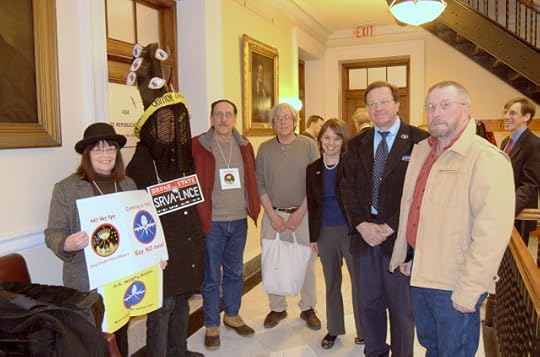
Maine’s newest senator, Angus King, appeared on television during the Brennan confirmation hearings to head the CIA. King appeared as a pundit talking about why flying killer robots are a “humane” weapon. He said on the MSNBC “Morning Joe” program: “In the context of 1,000 years of war, drones are more civilized.” I found this disturbingly short-sighted.
The continued domination of the Earth by the most violent among us depends upon being short-sighted. It is important that citizens never learn of the possibility of humans living peacefully together, cooperating rather than killing, loving rather than competing.
Dominating the airwaves that bring citizens their information has been the primary method of controlling the population. It is far more pervasive and, really, more effective than the use of brute force. (Which is resorted to whenever that is deemed necessary.) But force is often not needed as the constant messaging around the supposed superiority of violent methods, and the reminders about who wields them, are the very air citizens breathe in the 21st century.
School kids tell me every year that violence always wins. What else could they think growing up on millions of images selling them on the false idea that violence is stronger than love? Those of us in my generation can hardly imagine how pervasive this messaging is, surrounding them from their very infancy.
At the Academy Awards this year, the First Lady lady “bizarrely showed up surrounded by military service personnel in dress uniforms” according to blogger Alison Kilkenny.
Michelle Obama said of the nominees for Best Picture: “They reminded us that we can overcome any obstacle if we dig deep enough and fight hard enough and find the courage within ourselves.”
Commented Kilkenny, “Of course the nominees included Zero Dark Thirty and Argo, two propaganda films widely criticized for manipulating true events, and in the case of the former, outright lying by suggesting torture led to the capture of Osama bin Laden.” Since that time, corporate media have been promoting the story that Osama was brought to justice by the CIA’s so-called “Band of Sisters.”
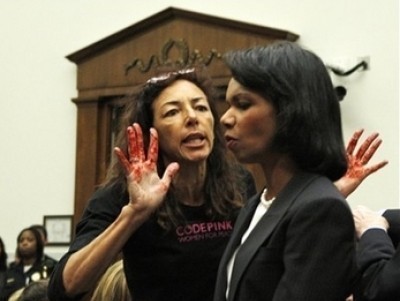
When women who work for the CIA on extrajudicial assassination, and women like Condi Rice, Madeline Albright and Hillary Clinton are held up as role models for feminists, we need to call them what they are: feminist war hawks. For myself, from now on I am going to make sure and use the phrase “feminist values” to distinguish life-affirming from death-dealing. I no longer want to call myself a feminist if these women are the face of feminism.
I am here to testify that once upon a time, long before Angus King’s 1,000 year window of prevailing violence, there were cultures on Earth that revered nature and respected human beings. These cultures did not have mass media, the internet, films or even photography to share their vision of what it means to be human, but we do see some of their artifacts and some of their shared wisdom was passed down to us in the form of oral traditions.
Voices that are silenced in the din of modern civilization are those that respect the Earth, revere life, and believe that mindful love and cooperation are far more powerful than violence. These voices are rising now. Idle No More is a powerful movement that swept the globe affirming this possibility.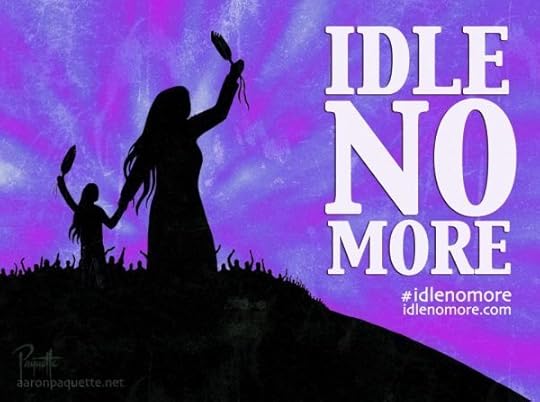
If we all come together and stop cooperating with the systems of violence, they will fall in a matter of days. But first, we must believe that it is possible. Cooperating to not cooperate is gar more powerful than most of us are able to imagine. I like the work of Jamila Raqib and Gene Sharp at the Albert Einstein Institution for the study of non-violent methods, because their work stimulates my belief. Their studies give us a chance to examine what worked and what didn’t, and which strategies seem the most effective. I understand that they named their institute after Einstein because he once stated that if 2% of the population would stop cooperating with the military-industrial system, it would fall. I don’t know if he was right about that, but it’s an intriguing idea — and he was right about a lot of other things!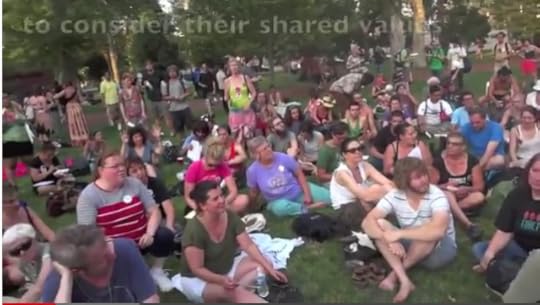
Around 150 people at the Feminist Values GA in Philadelphia July 2, 2013
Coming together and accessing collective wisdom is the genius of feminist values. It’s not about women being more right than men. Women can lose sight of feminist values as they claw their way to the top of hierarchical systems, and many men embrace feminist values, including those right here in this room who know from experience the bliss of being in community.
One way to be in community: consider joining us in bringing messages of hope and solidarity to your neighbors. The Bring Our War $$ Home campaign will soon be distributing door hangers of the type pizza restaurants use, with the message “A Budget For Fall — Why Not?” We’ll be fanning out into our communities with the message that our resources belong to the people and must be used for life, not for death-dealing. It’s a great opportunity to talk to your neighbor, the person in line at the post office, or the person who cleans you classroom about what we have in common. You may be surprised at the great conversations that the doorhangers are a vehicle for, especially around tax time and as our so-called leaders prepare to cut Social Security, Medicare, and many other safety nets for low income citizens.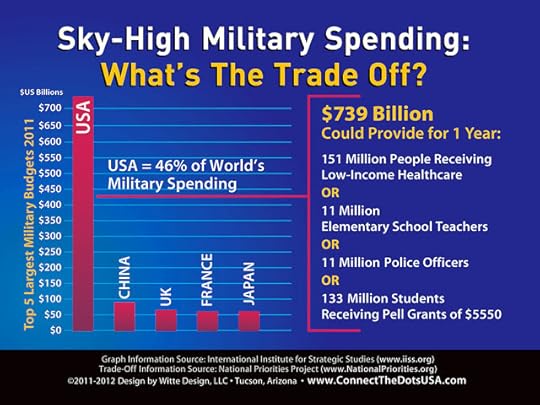
You can contact Bruce Gagnon to order doorhangers, which organizations are buying at cost for their members to distribute. They are 5 cents apiece.
Thank you all for coming together today in a Maine Alliance for the Common Good. I am grateful to be here with you.
– Lisa Savage’s remarks on a panel discussion at the Alliance Teach-In “Budget For All — Why Not?” at the UMaine Orono on Sunday, April 7, 2013. 







April 3, 2013
Why I’ll be Going to Dallas for the People’s Response to the George W. Bush Library & Institute on April 22nd
By Diane Wilson
I was raised in a small coastal fishing town in Texas where concealed handguns are legal and hunting is equated with ritual. But I developed a total aversion to killing during my time as an army medic in the Vietnam War.
I joined up—a 19-year-old girl—because I was enthralled with Life Magazine’s early war photos of injured Army medics caring for the wounded in Viet Nam. Those black and white photos were grisly but I couldn’t get away from the all- American-hero mentality that it offered up to me. I would go to Viet Nam and be a Florence Nightingale!
I didn’t go to Viet Nam. I was sent to Brooks Army Burn Center and Fort Sam Houston Medical where Vietnam casualties were evacuated. In the wards where I worked, patients were constantly swiping the needles to shoot up and a pot haze hung in the air like smoke from a lingering fire. To show gratitude for my F.Nightengale-like care, the guys showed it in the only way they knew how: filing my nurse pocket with every pill known to mankind. There was enough dope to float a battleship. The medical administration knew about the situation but they turned a blind eye. The drugs kept the guys quiet.
This was a lost generation of boys and I will never forget their faces. It’s not hard to do when the same lost look is on the face of the vet I married. Several years ago, this same Vet I was now divorced from was diagnosed with 100 percent PTSD (post traumatic stress disorder)–forty years after the Viet Nam war that defined our generation.
Another war wasn’t something I wanted to see again. So before the invasion of Iraq, I went with Medea Benjamin to Washington, D.C., and we disrupted a House Armed Services Committee hearing where Donald Rumsfeld, the secretary of defense, was stating his case for war with Iraq. It was a spontaneous moment spurred by our wish to do something to stop the war, and it made national news because we did it while the TV cameras in the room were rolling.
Then, weeks before the US invasion in March 2003, I went to Iraq with a group of CODEPINK women. Before I left, I had heard a lot about how the Iraqis hated Americans and envied our lifestyle and freedom. With that in mind, I was totally surprised with what I experienced in Baghdad—instead of hatred and suspicion and grudges galore, I met people who were open and curious and generous. When I asked them if they were angry about the Americans on the verge of bombing their country, they all said, “We know it isn’t the American people at fault, but the administration.” Unlike so many people in the United States who think all Arabs are terrorists, Iraqis understood the difference between the American people and U.S. government policies. During my entire stay in Bagdad, there was never a time when the Iraqis were not unfailing gracious.
At the end of our trip, it was quite clear the Iraqis were afraid of the U.S. invasion. I was afraid, too, so how could they not be? The waiters in our Baghdad hotel begged us not to leave. The children who met us every morning after our coffee—and who charmed us with their sales of pastries and scarves and shoe shines—hung on to our arms on our last day there and cried tears of desperation. They acted as if somehow, if we remained, the bombs wouldn’t fall. I remember giving my coat to a little nine-year-old boy and he clutched it like it would protect him from a falling bomb.
The Iraqi people had no idea what to do to protect themselves and one gesture, in particular, reminded me of the futile things we resort to in my own hometown when a hurricane threatens the Gulf Coast: they taped their windows. It was almost surreal. A monumental thing is fixing to happen and there’s not much you can do to prepare for it, but you know it’s going to change your life. Tape your window.
One month later, a group of women from across the nation staged a hunger strike and vigil at Lafayette Park in front of the White House. We remained in the park, in the dead of winter, protesting the war and promoting peace for several months. During one protest, I scaled the fence in front of the White House with an antiwar banner and stayed up there dancing for about five minutes until I was shoved to the ground by the Secret Service. For that action, I was arrested, jailed, and banned from Washington for an entire year. The Secret Service felt so threatened by our nonviolent antiwar protests and my dancing on a White House pillar that they followed me to my hometown in Seadrift! They visited my neighbors and even the Seadrift Elementary School!
Still, I felt compelled to do more than just sit in Seadrift and grieve. So on the day before half a million Americans took to the streets of New York and people around the globe protested the invasion, a delegation of CODEPINK women assembled before the UN gate to protest. I climbed the fence and chained myself to it. I was then arrested and sent to trial. Later, back in Texas, two other protesters and I stood in the state capitol and shouted down a resolution supporting the war. For that I got four days in a women’s correctional facility outside Austin.
But still, I didn’t do enough. I don’t think I’ve ever regretted any failure as much. A war rages, children die, families are blown apart—and we are all too well behaved. I’m a fourth-generation commercial fisherwoman, born and raised in Texas and baptized in a river by a Pentecostal preacher. I’ve also been an environmental activist fighting the destruction on the Texas bays for years. My environmental activism flowed into the peace movement, and that flowed into CODEPINK. Just like the ecosystem where I shrimp, it’s all connected. The corporations like Formosa and DuPont and Dow are destroying the Texas bays and killing small communities like my town, and the federal government bombs a whole country to control its oil. It’s the same destructive mentality at work.
This is why I’m going to the People’s Response of the Bush Library in a few weeks: we must never never forget the face of The Destroyer just as we must never never forget the faces of those destroyed.
Diane Wilson is a shrimper, anti-toxics activist and author of An “Unreasonable Woman: A True Story of Shrimpers, Politicos, Polluters, and the Fight for Seadrift, Texas”. She is one of the co-founders of CODEPINK: Women for Peace.







April 2, 2013
Challenges of Arab Uprisings Reflected at World Social Forum
Medea Benjamin
“This was like a dream come true,” said a radiant Sossi Mohamed Sadek, a Tunisian second year engineering student who was one of the hundreds of local volunteers at the World Social Forum in Tunis. “To see our university overflowing with over 50,000 people from Africa, Europe, Latin America, the United States, the Middle East—it was extraordinary. I came away with new ideas and new friends that will surely have a great impact on my life.”
Many Tunisians were thrilled to have hosted the eleventh World Social Forum, held from March 26-30, 2013. It marked the first time that the world’s largest global gathering of progressives—a gathering born in Brazil in 2001 out of the protests against corporate-dominated globalization—took place in an Arab nation. It came at a time when the world has been rocked by grassroots uprisings in the Arab world, but also increasing mobilizations to counter the climate crisis, and massive economic protests from southern Europe to “Occupy” groups in the United States to student movements from Quebec to Chile.
In recognition of the overarching danger of climate chaos, this was the first Social Forum to have a dedicated “Climate Space” with ongoing discussions about issues such as the need for food sovereignty, water justice and respect for the rights of indigenous and forest peoples. The climate sessions also denounced false solutions being put forward by many governments and corporations, including biofuels, GMO crops and geoengineering.
The debt/trade section of the Forum focused on ways to counter austerity measures, destructive free trade agreements and the onerous debts imposed by banks on both governments and individuals. Participants searched for alternatives to the undemocratic economic reforms being pushed by international lenders in countries such as Italy, Greece, and Cyprus, but also in Tunisia and Egypt, where the people are being asked to pay for debts incurred by previous dictators.
Interspersed throughout the forum’s hundreds of workshops, dozens of assemblies and street rallies were the challenges, contradictions and unresolved clashing visions since the early heady days of the Arab Spring.
One of the contradictions involves the role of women. The Arab Spring has spawned a new women’s movement in response to the rise of conservative religious governments in the region. According to Forum organizers, that’s why a women’s assembly was chosen to open the Forum. “The new regimes want constitutions to be more religious, and women all over the region are taking a stand against this,” said Hamouda Soubhi from Morocco. In the raucous, jam-packed women’s assembly, women cheered, chanted and applauded their sisters standing up to male oppression. “When we have situations like in Egypt where women are raped while attending demonstrations, we obviously have unfinished revolutions and need this kind of gathering to re-inspire us,” said a beaming, young Egyptian activist.
This clash between Islamists and secularists in the Arab world was present throughout the Forum. Plastered on the walls was the photo of Chokri Belaid, a Tunisian lawyer, Marxist, and leader of the leftist Popular Front who was murdered in February. Many Tunisian leftists used the Forum to denounce the new government run by the Ennahda party. But government supporters insisted that Ennahda is a moderate, tolerant Islamist party and felt that the secular vision was overrepresented at the Forum. At one of the closing assemblies, a government supporter encouraged forum goers to talk directly to Ennahda members instead of simply talking about them.
But it was the conflict in Syria that really spilled over into the forum in an ugly way, with supporters of Syrian President Bashar al-Assad shouting down and beating up opposition supporters—even women. Rumor had it that the Assad government purposely sent provocateurs to the forum. The atmosphere was so explosive that a group wanting to discuss nonviolent alternatives in Syria felt compelled to leave campus and meet instead in a downtown hotel.
Other conflicts highlighted at the forum were the Palestinian struggle and the lesser-known 37-year-old liberation struggle of the people of Western Sahara, now occupied by Morocco. There were several confrontations at the Forum on this issue as well, when Moroccan government supporters—at workshops and on stage at a plenary—attempted to shout down (and on one occasion punch) the independence activists.
Given the life-and-death struggles in the region, coupled with government infiltrators and agitators, organizers were proud that they managed to calm tensions internally, without ever having to call the police, and that no one was seriously hurt.
At one of the closing gatherings, participants were asked to evaluate the forum. Many of the criticisms were about poor planning and logistics: 20 percent of the hundreds of workshops never took place; locations were hard to find and there were scores of last minute room changes; nothing started on time; translation equipment rarely worked; speakers spoke too long, leaving no time for discussion.
Some complained that for a forum that is supposed to pose alternatives, the sessions are old-fashioned “talking heads” instead of interactive. US environmental activist William Kramer said, “I’m used to more participatory processes, not just presentations. For me, it was really the spaces between events where I learned the most.” Some of the younger folks, including US participants from the Occupy movement, created their own democratic space to have an open dialogue with Tunisians.
Other criticisms were about lack of concrete solutions. The larger assemblies often turned into simply denunciations of corporations, governments and capitalism. “If slogans could win,” said one participant, “the left would be in power. Chanting ‘smash capitalism’ might make us feel good, but it doesn’t provide a path forward.”
Others wanted more global actions to emerge from the summit, not simply statements. Past forums have led to critical global actions, such as the February 15, 2002 global day of protests against the pending US invasion of Iraq, or joint campaigns to stop international free trade agreements. At this forum, groups working on different issues came up with new networks and joint campaigns—for example, the anti-drone workshop was attended by people from 15 countries who decided to form a global anti-drones network—but there was no call for a particular global action coming from the Forum as a whole.
When asked if the forums should continue, there was unanimous support. “Where else could we possibly come together like this and inspire each other to create another world?” said Eyad Bilad, a Tunisian student. Evoking the name of Mohamed Bouazizi, the Tunisian fruit vendor who set himself on fire, triggering the events that led to the Arab Spring, he added, “For all those who have died struggling for justice, we must continue to learn from each other how to build a world that does not respond to the greed of dictators, bankers or corporations, but to the needs of simple people like Mohamed Bouazizi.”
Medea Benjamin, cofounder of www.codepink.org and www.globalexchange, is author of the book Drone Warfare: Killing by Remote Control.







March 29, 2013
Dispatches from the World Social Forum in Tunisia
Egyptian Female Cartoonist Pokes Fun at Fundamentalists
Medea Benjamin
One of the women who spoke at the Women’s Assembly during the World Social Forum in Tunisia was not a political activist, but a cartoonist. Dooa Eladl is 34-year-old Egyptian woman who calls herself a Muslim anarchist. Her work appears in the prominent newspaper Al-Masry Al-Youm—Egyptians Today. She has become one of Egypt’s best-known political cartoonists, in a field completely dominated by men. (One of her humorous drawings is a portrait of herself marching to work, her hair tied to the mustaches of four of her male colleagues.)
During the Egyptian uprising, Eladl and her colleagues supported the revolution by printing up some of their fiercest political satire, the kind that would not have been published, and handing them out in Tahrir Square. “I don’t think artists like myself should be members of political parties or organizers, but we should certainly use our art to speak out against injustice and oppression.”
Eladl’s blistering caricatures have landed her in hot water with some of Egypt’s powerful fundamentalists. She now has the distinction of being the first cartoonist in Egypt to face blasphemy charges. In 2012 Salafi lawyer Khaled El-Masry, Secretary General of a group called National Center for Defense of Freedoms, filed a complaint against her for defaming religious prophets. The cartoon he objected to shows an Egyptian man with angel wings lecturing Adam and Eve. The man is telling Adam and Eve that they would never have been expelled from heaven if they had simply voted in favor of the Brotherhood’s draft constitution in the recent Egyptian referendum. The court has not yet heard the case.
If the fundamentalists are upset about her irreverent depictions of religious figures, one has to wonder if they have seen her searing drawings about women’s rights—and wrongs. One cartoon against child marriage shows a lecherous, old man with a cane peering greedily up the skirt of a little girl holding a teddy bear.
Another has the streaming beard of a fundamentalist flowing across a woman’s mouth to silence her.
Eladli uses her art to bring attention to domestic violence, underage marriage, sexual harassment, violence against women, and the new phenomenon of attacks against male demonstrators. Some accuse her of being sacrilegious, claiming hat her work is too shocking. The accusations don’t seem to phase her, and they certainly haven’t influenced her style.
Most disturbing, yet thought-provoking, is one cartoon against female genital mutilation, in which a man is standing on a ladder between a woman’s legs, reaching up to cut her with a pair of scissors.
“I criticize habits that I think are wrong and should be totally reconsidered, like female circumcision, which doesn’t stem from the Muslim religion at all. There are Muslim scholars who say female circumcision is a crime against humanity and is not related to Islam. Yet it is still being practiced in Egypt’s countryside and unfortunately, in the name of religion.”
While Eladl was delighted to see Mubarak ousted, she says that in many ways, the situation for women is worse because now those in power use religion to dominate women. A Muslim who covers her head out of choice, Eladl is vehemently opposed to the Muslim Brotherhood. “They interpret religion in their own way but I don’t think it is the real way of Islam. Since the revolution, I feel compelled to draw cartoons about women in order to defend my own personal freedoms, which are threatened under the rule of the Muslim Brotherhood.”
Eladl complains that the new constitution does not guarantee women’s rights or respect the international treaties that protect women. It does not give rights to divorced women or guarantee equal rights for women workers. If the constitution is implemented, she fears women’s right will be turned back.
One of her cartoons shows a professional-looking woman walking up to the door of Parliament, only to be told by a bearded man “Sorry, this is only for men.”
Eladl’s critique of the post-Mubarak era goes way beyond the treatment of women.She says there has been little change in general because the new government is similar to the old, more concerned about holding onto power than making life better for the poor. One drawing depicts the “new ruler” as a bull, fighting the military matador to get onto the king’s throne.
Another shows the head of Mubarak severed from his body, but his suit plastered with the faces of many more Mubaraks.
Eladl is also disappointed in U.S. policy. Like millions in the Arab world, she had high hopes when Obama was first elected. “We were so hopeful when Obama came to Cairo with his beautiful speech, but then we saw that he continued to support repressive regimes, including here in Egypt, and that his words were hollow.” That’s why she drew a cartoon of Obama surrounded by a huge empty speech bubble. Another sketch shows Qaddhafi’s army shooting at civilians, while a big arm of America reaches out to grab a giant barrel of oil. The caption says: “America lends a hand to Libyan revolutionaries.“ “I see the hypocrisy of U.S. policy, intervening in places like Iraq and Libya that have a lot of oil, but not in the case of Syria,” says Eladl.
If Eladl is worried about the blasphemy case and the enemies she is making with her scornful brushstrokes, she doesn’t show it. “The extremists don’t scare me,” she insists. “Whatever they do, I will continue to use my skills to poke fun at them. They must understand that we Egyptians have changed with the revolution, and we will not go backwards.”
Medea Benjamin is cofounder of www.CODEPINK.org and www.GlobalExchange.org.







Medea Benjamin's Blog
- Medea Benjamin's profile
- 93 followers


